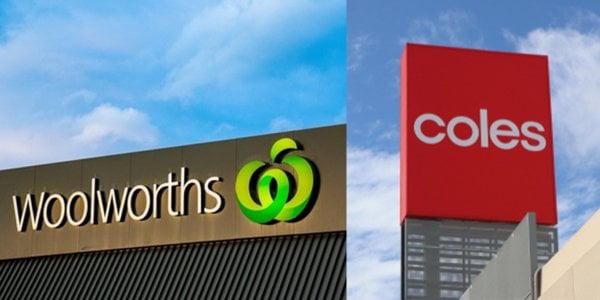Supermarket chains under fire: Coles and Woolworths slammed for 'low prices'
Australia's grocery shoppers may have noticed an abundance of yellow and red discount tags lining the aisles of Coles and Woolworths in recent months.
But don't be fooled by this sudden generosity, consumer advocates and politicians warned. The truth behind the supermarket giants' pricing practices is far more complex—and concerning.
Coles and Woolworths, which together control a staggering 65 per cent of Australia's grocery market, have announced price cuts on hundreds of products in response to the cost-of-living crisis squeezing household budgets.
However, this move comes as the two retailers face intense scrutiny over their market dominance, pricing behaviour, and treatment of suppliers.

A parliamentary inquiry is underway to examine how Coles and Woolworths set prices for customers and pay farmers and other providers.
The investigation was launched after allegations emerged that the supermarkets had been price gouging and profiteering during a period of high inflation and financial strain for many Australians.
Independent MP Dr Monique Ryan, who has received numerous complaints from concerned constituents about grocery prices, believed the recent discounts are a sign Coles and Woolworths are ‘under pressure’.
‘Don't be deceived,’ Dr Ryan stated. ‘Coles and Woolworths still earned billion-dollar profits last year while increasing their prices by 10 per cent.’
She noted that Australia's grocery sector is more concentrated in the hands of a few major players than almost anywhere else in the world, making real competition and consistently low prices difficult to achieve.
‘Reducing prices for a couple of months won't fix any of that. Everyone has to keep pressure on the government to institute bold reforms to make the sector more competitive,’ she added.
Bold reforms are needed to improve competitiveness in the long term, Dr Ryan argued.
‘We need prices to stay low,’ she said. ‘Not for a couple of months, but for a couple of decades.’
Farmers and producers are also demanding action, accusing major supermarkets of overcharging shoppers while underpaying suppliers.
One farmer even sold his huge watermelons for $10 by the roadside because he couldn't afford to sell them for the low prices offered by supermarkets.
The National Farmers Federation is calling for harsh penalties, including caps on market share growth and even forced divestments, for retailers found to be consistently breaching consumer and competition laws.
However, Prime Minister Anthony Albanese has rejected big stick approaches, comparing them to the policies of the former Soviet Union.
The Australian Competition and Consumer Commission (ACCC) has launched its own year-long inquiry into grocery pricing and whether the major supermarkets' outsized market power is hurting consumers.
The findings could have major ramifications for Coles, Woolworths and the broader grocery sector.
Potential outcomes may include recommendations for stronger price monitoring, codes of conduct governing dealings with suppliers, or even more significant efforts to reduce market concentration.
The two retailers have been approached for a comment on this matter. While Coles had not released a statement yet, a Woolworths spokesperson said: ‘We know many Australian families are doing it tough and looking for relief at the checkout.’
‘We know our customers are looking for lower prices and offers to help them manage their budgets, and we want to help them to spend less when they shop with us,’ they added.
For now, though, Australians will need to look beyond the sea of discount tags and ask whether the underlying dynamics of the grocery market are really working in their favour.
As the parliamentary and ACCC inquiries unfold, the full story behind Coles and Woolworths' prices will be revealed—and it may prove very different to the image presented in the supermarket aisles.
 What do you think about the recent price-slashing by these supermarket giants? Share your thoughts in the comments below!
What do you think about the recent price-slashing by these supermarket giants? Share your thoughts in the comments below!
But don't be fooled by this sudden generosity, consumer advocates and politicians warned. The truth behind the supermarket giants' pricing practices is far more complex—and concerning.
Coles and Woolworths, which together control a staggering 65 per cent of Australia's grocery market, have announced price cuts on hundreds of products in response to the cost-of-living crisis squeezing household budgets.
However, this move comes as the two retailers face intense scrutiny over their market dominance, pricing behaviour, and treatment of suppliers.

Woolworths and Coles have announced price cuts on hundreds of products in recent months. Image source: Shutterstock
A parliamentary inquiry is underway to examine how Coles and Woolworths set prices for customers and pay farmers and other providers.
The investigation was launched after allegations emerged that the supermarkets had been price gouging and profiteering during a period of high inflation and financial strain for many Australians.
Independent MP Dr Monique Ryan, who has received numerous complaints from concerned constituents about grocery prices, believed the recent discounts are a sign Coles and Woolworths are ‘under pressure’.
‘Don't be deceived,’ Dr Ryan stated. ‘Coles and Woolworths still earned billion-dollar profits last year while increasing their prices by 10 per cent.’
She noted that Australia's grocery sector is more concentrated in the hands of a few major players than almost anywhere else in the world, making real competition and consistently low prices difficult to achieve.
‘Reducing prices for a couple of months won't fix any of that. Everyone has to keep pressure on the government to institute bold reforms to make the sector more competitive,’ she added.
Bold reforms are needed to improve competitiveness in the long term, Dr Ryan argued.
‘We need prices to stay low,’ she said. ‘Not for a couple of months, but for a couple of decades.’
Farmers and producers are also demanding action, accusing major supermarkets of overcharging shoppers while underpaying suppliers.
One farmer even sold his huge watermelons for $10 by the roadside because he couldn't afford to sell them for the low prices offered by supermarkets.
The National Farmers Federation is calling for harsh penalties, including caps on market share growth and even forced divestments, for retailers found to be consistently breaching consumer and competition laws.
However, Prime Minister Anthony Albanese has rejected big stick approaches, comparing them to the policies of the former Soviet Union.
The Australian Competition and Consumer Commission (ACCC) has launched its own year-long inquiry into grocery pricing and whether the major supermarkets' outsized market power is hurting consumers.
The findings could have major ramifications for Coles, Woolworths and the broader grocery sector.
Potential outcomes may include recommendations for stronger price monitoring, codes of conduct governing dealings with suppliers, or even more significant efforts to reduce market concentration.
The two retailers have been approached for a comment on this matter. While Coles had not released a statement yet, a Woolworths spokesperson said: ‘We know many Australian families are doing it tough and looking for relief at the checkout.’
‘We know our customers are looking for lower prices and offers to help them manage their budgets, and we want to help them to spend less when they shop with us,’ they added.
For now, though, Australians will need to look beyond the sea of discount tags and ask whether the underlying dynamics of the grocery market are really working in their favour.
As the parliamentary and ACCC inquiries unfold, the full story behind Coles and Woolworths' prices will be revealed—and it may prove very different to the image presented in the supermarket aisles.
Key Takeaways
- Supermarkets, specifically Coles and Woolworths, are under scrutiny for the high number of discounted items amidst a parliamentary inquiry into supermarket pricing.
- Independent MP Dr Monique Ryan warned Australians not to be deceived by these discounts, emphasising that the supermarkets still have significant market control and have increased prices in the past.
- The Australian Competition and Consumer Commission (ACCC) is conducting a year-long inquiry to determine if consumers are being overcharged at the checkout.
- Farmers are advocating for strict penalties on supermarkets that overcharge customers and exploit suppliers, including a cap on market share growth and divestiture powers.







